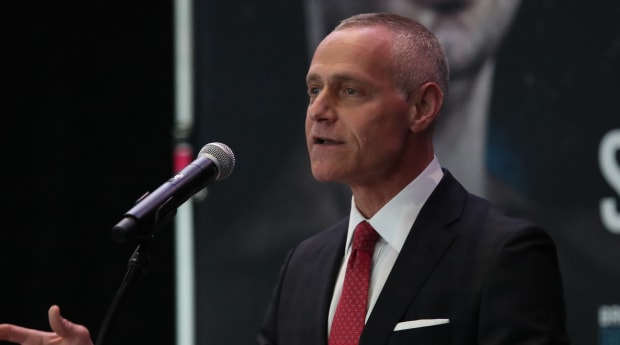LAS VEGAS, Nev. – The Big 12 is targeting a talent agency executive to be its next conference commissioner.
Brett Yormark, the COO of Jay-Z’s Roc Nation, is finalizing a deal to be the new leader of the Power 5 league, sources tell Sports Illustrated, a stunning move that brings yet another outsider into college sports’ most exclusive and powerful group.
Yormark, 55, has spent the last three years at Roc Nation, originally as co-CEO with twin brother Michael. In his various roles at Roc Nation, he’s worked with artists, athletes, leagues, teams and brands and oversees sponsorship, licensing, content partnerships and brand strategy. These are essential elements and qualities especially beneficial in an ever-changing college sports landscape that entered a new phase last July with the lifting of the NCAA’s amateurism rules. The era of name, image and likeness (NIL) has brought legalized athlete pay, agent involvement and player branding never before seen in college sports.
Yormark is thought of as one of the more connected and bright executives within the entertainment agency industry. He was promoted in January to COO and president of business operations and strategy. Desiree Perez, CEO of Roc Nation, has referred to Yormark as “a fearless leader.”

Edward Diller/Getty Images
In the Big 12, Yormark has big shoes to fill. He replaces a legendary figure in college athletics in Bob Bowlsby, and he must navigate a rapidly changing world in a conference dealing with incredible change itself. Its two richest members, Texas and Oklahoma, are bound for the SEC in 2025. Their exit timing and fee are essential issues on the new commissioner’s to-do list, as well as renegotiating the league’s media rights deal, which ends after the 2024-25 season. The Big 12 will be following the SEC, Big Ten and Pac-12 in renegotiating its TV contract—a prickly position to navigate as its media rights revenue is expected to decrease. Meanwhile, four new members in UCF, Houston, Cincinnati and BYU are entering the league, enhancing what many already believe to be the country’s best men’s college basketball league.
For many, the move is shocking. But it does follow a similar decision last year when the Pac-12 hired George Kliavkoff, an MGM Resorts sports and entertainment executive. Kliavkoff was hired a year after the Big Ten went outside the industry with its pick to replace Jim Delaney: Kevin Warren, a former Minnesota Vikings executive.
Yormark enters the industry at a volatile time when the NCAA’s five richest conferences are seeing their power and authority swell as the NCAA loses its grip on college football. The Power 5 leagues—Big Ten, SEC, ACC, Big 12 and Pac-12—are soon to have more legislative power than ever, with the ability to shape rules and even enforce policy on their own.
He joins a group of 11 people who make up the College Football Playoff Management Committee, arguably the most powerful group in college sports. The 10 FBS commissioners and Notre Dame athletic director Jack Swarbrick control the future of the CFP and expansion and may soon even preside over FBS football as many expect it to work its way from under the NCAA’s umbrella.
Yormark has little if any college sports experience but he’s been integral in professional basketball. Before joining Roc Nation in 2019, he spent 14 years as CEO of BSE Global, which manages the Barclays Center and the Brooklyn Nets. Under his leadership, Barclays secured agreements to host NCAA men’s basketball tournament games, the ACC men’s basketball tournament and several high-profile non-conference matchups in the sport involving Kentucky, Kansas, Duke and North Carolina. The Nets, meanwhile, moved from New Jersey to Brooklyn under his watch.
Prior to that, Yormark worked for NASCAR for six years, where he helped build the stock-car racing company into a major sports property. He was named the maximum three times to the “Forty Under 40” list by Sports Business Journal. He is the father of two children and is married to Elaina Scotto.
The Big 12 commissioner job was a highly sought-after position. A bevy of high-profile athletic directors were in the mix as well as some conference executive staff members, but the league took a different approach. Over the last two days, a small group of Big 12 presidents interviewed three finalists in Dallas. None of the final candidates currently work in the college sports industry.







